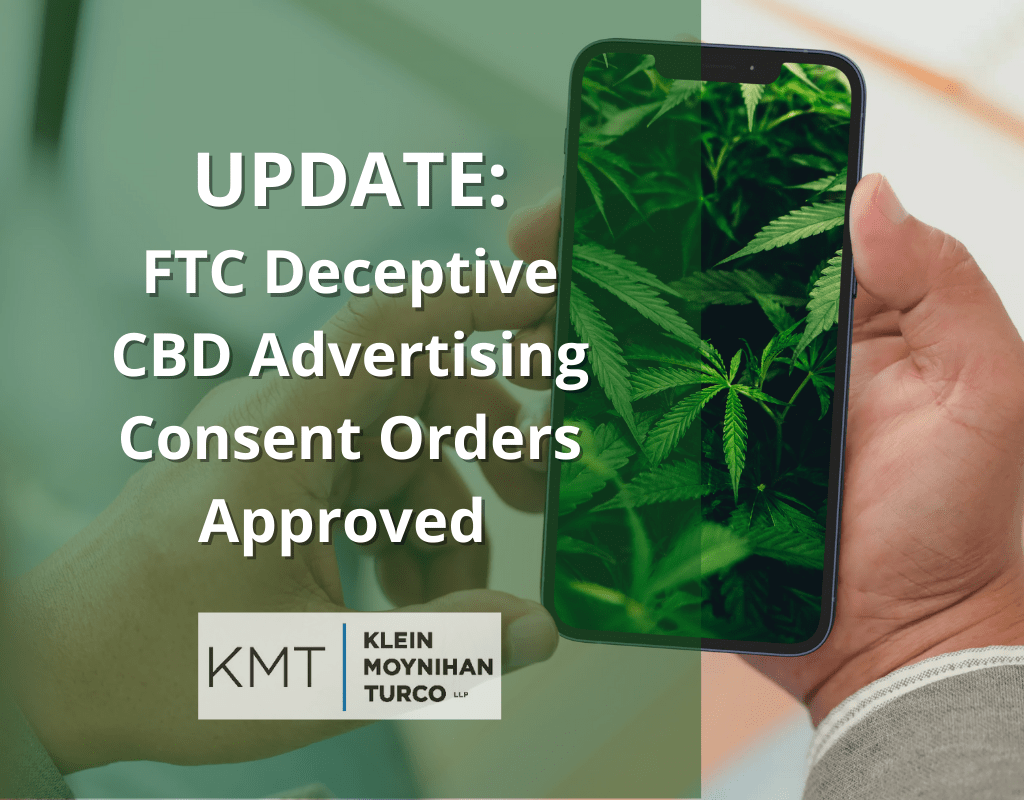Recently, we wrote concerning six cannabidiol (“CBD”) companies (the “Sellers”) that had settled enforcement actions with the Federal Trade Commission (“FTC”). On March 5, 2021, following public comment, the FTC approved final administrative consent orders against the Sellers for engaging in deceptive CBD marketing practices. Although CBD was removed from the Controlled Substances Act (“CSA”) with the passage of the Agriculture Improvement Act of 2018 (the “Farm Bill”), to date, confusion remains as to what constitutes acceptable CBD advertising. To avoid running afoul of the law, businesses must consider various state and federal regulations (including regulations enforced by the FTC and Food and Drug Administration (“FDA”)) when advertising CBD products for sale to the public.
How do the FTC and FDA regulate CBD Advertising?
The FTC and CBD Advertising
Unfair and deceptive advertising is prohibited by the FTC under Sections 5(a) and 12 of the FTC Act. In the cases at hand, the Sellers advertised that their respective CBD products were “medically proven” to treat pain without providing the requisite scientific evidence to substantiate such claims. The FTC specifically identifies as unlawful the use and publication of unproven marketing claims that are likely to “induce the purchase of food, drugs, devices, services, or cosmetics.” Had the Sellers procured “competent and reliable scientific evidence,” or “well-controlled human clinical studies substantiating that the claims are true,” they would not have found themselves the subject of FTC investigation. In general, CBD companies should abide by the simple rule that if their CBD advertising is “misleading in a material respect,” the FTC will consider it false adverting subject to enforcement action.
The FDA and CBD Advertising
The Farm Bill preserved the FDA’s authority to regulate CBD products under the Federal Food, Drug and Cosmetics Act (the FD&C Act”) and Section 351 of the Public Health Services Act (the PHS Act”). The FDA has recently issued warning letters to CBD businesses that: (1) sell unapproved new drugs; and (2) misbrand their products. The FDA will deem a product misbranded if it is labeled in a false or misleading way, does not bear required labeling information, or is otherwise produced or packaged in a deceptive manner. Products that are found to violate the FD&C Act will be evaluated by the FDA to decide whether to initiate enforcement action. These factors include, among other things, then-existing FDA resources and the threat to public health. Additionally, the FDA may consult with other federal agencies and/or state law enforcement in making decisions about whether and how to enforce FD&C Act violations. In fact, the FTC and FDA often work together in investigating CBD advertising violations.
CBD companies that seek to advertise their CBD products should consult with a knowledgeable advertising attorney before launching any CBD marketing campaign. Failing to do so could result in an FTC or FDA investigation.
If you are the subject of an FTC or FDA investigation or need assistance with a CBD product marketing campaign, please email us at info@kleinmoynihan.com, or call us at (212) 246-0900.
The material contained herein is provided for informational purposes only and is not legal advice, nor is it a substitute for obtaining legal advice from an attorney. Each situation is unique, and you should not act or rely on any information contained herein without seeking the advice of an experienced attorney.
Attorney Advertising
Related Blog Posts:
TTAB Prohibits Registration of CBD Trademark




